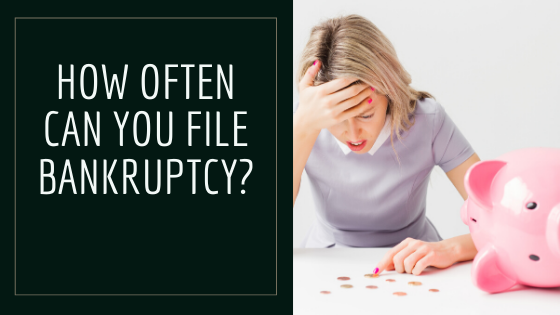Filing for bankruptcy causes a massive dent in your credit report. But unfortunately, some people may need to file it not once but multiple times. The good thing about bankruptcy laws is that they are accommodating. Part of the law means that you can file more than once. However, the filing does not come without limitations.
Several factors will decide your type of bankruptcy. They include the type of bankruptcy you had filed previously and whether it had a discharge. Besides that, an application for subsequent bankruptcy depends on what type you are considering filing.
Table of Contents
ToggleThe Basics of Bankruptcy
Generally, the process of filing for bankruptcy isn’t easy. In fact, for an average person, it’s usually complicated. The legal complexity is because there are specific rules and regulations with which you need to comply. For instance, it should be evident that you can’t pay your debts. Also, you need to show that you have had credit counseling with a professional credit counselor.
Types of Bankruptcy
Chapter 7: Chapter 7 is the traditional type of bankruptcy. As a debtor, you must pay your creditor, or your property will be given out to clear the debt. In Chapter 7, you need to pay as much debt as possible.
Chapter 13: Chapter 13 involves restricting your payments so that they are manageable. Besides that, Chapter 13 involves paying part of the debt so that it can become more manageable.
What is a Discharged Bankruptcy?
Once the bankruptcy proceedings are complete, that is a discharged bankruptcy. In Chapter 7, a discharge occurs once all your assets are sold and you have paid your lenders. In the case of Chapter 13, a discharge occurs once you have finished your repayment plan.
How Often Can You File Bankruptcy
Generally, you can file for bankruptcy as many times as you want. All you have to ensure is that you are eligible for the subsequent one. Below is an overview of how often you can file for bankruptcy and the implications of each type.
Chapter 7 Bankruptcy
You can file this type of bankruptcy as many times as you can. Additionally, you can file a Chapter 13 bankruptcy after getting a Chapter 7 discharge. However, there are rules applicable for filing each subsequent bankruptcy.
Chapter 7 to Chapter 7
You can file another Chapter 7 after getting a discharge from the previous one. But there are specific restrictions regarding the waiting time before you can file. Once all the debts have been discharged, you can’t file another bankruptcy under this chapter for eight years.
If you file a Chapter 7 within eight years after the previous one, you won’t get a discharge. This means that you will still be responsible for all your debts legally.
Chapter 7 to Chapter 13
If you want to file a Chapter 13 bankruptcy after getting a Chapter 7 discharge, you should wait for four years. You can only discharge your medical bills, credit card debts, and personal loans.
If you decide to file a Chapter 13 bankruptcy before four years is over, then all your unsecured debts won’t get discharged. The 4-year period typically starts when you filed the Chapter 7 bankruptcy.
Chapter 13 Bankruptcy
You can file another Chapter 13 bankruptcy or even Chapter 7 after getting a discharge. However, there are specific time limits that you need to be aware of. This is if you want to get a complete discharge of all your debts.
Chapter 13 to Chapter 7
If you have a discharge from Chapter 13 bankruptcy, you must wait six years before filing a Chapter 7 bankruptcy. Note that it’s possible to get a full debt discharged in Chapter 7 bankruptcy, even if you do the filing within six years. However, you must pay all the unsecured lenders at least 70 percent during Chapter 13’s previous bankruptcy. You won’t get a discharge if you file for a Chapter 7 bankruptcy and have not cleared at least 70 percent of your last Chapter 13 debt. This means that you should wait for the 6-year time frame to elapse.
Chapter 13 to Chapter 13
If you had previously received a discharge from Chapter 13 bankruptcy, you need to wait two years before filing another similar bankruptcy. But if you file another Chapter 13 bankruptcy within two years from the previous one, your new bankruptcy won’t be eligible for a discharge.
Benefits of Filing for a Bankruptcy
If you have successfully got a discharge for previous bankruptcy and you are now eligible for a new one, then you need to consider the benefits they offer.
Benefits of Chapter 13
There are several advantages of Chapter 13 bankruptcy over Chapter 7. They include:
Saving Property from Foreclosure
This is the top advantage of Chapter 13 bankruptcy. As an individual with debt, you can protect your home from foreclosure. However, you must make sure you pay all the mortgage during Chapter 13 bankruptcy. The good thing is that you can make up for any missed mortgage payments.
The Option of Removing Higher Mortgages
Sometimes it’s impossible to pay the first mortgage only after filing for Chapter 13 bankruptcy. There is a term that’s called lien stripping. This means that you can keep your house by removing a 2nd or other higher mortgage. As a result, you will only have to pay the first mortgage.
Debt Discharge
With Chapter 13 bankruptcy, you only need to pay what you can afford. With the 3-5 year pay period, you don’t need to pay 100 percent of all your debt. Generally, most people only pay a fraction of the debt. The remaining amount will be wiped out, and you will gain a new financial start.
Pay What You Can
Chapter 13 bankruptcy allows you to pay what you can afford. As a debtor, you need to make monthly payments to the trustee. Generally, the amount depends on your budget. This involves a combination of the IRS standards, actual monthly expenditure, and the Chapter 13 Trustee’s standards. What you will pay depends on the income subtracted from the combination of the above expenses.
The Credit Report Period
Chapter 13 bankruptcy has the best credit report period over Chapter 7. This bankruptcy has a credit report period of 7 years only. On the other hand, Chapter 7 has a period of 10 years. Note that a good credit report is crucial, especially if you want to work with lenders in the future.
Benefits of Chapter 7 Bankruptcy
While Chapter 13 seems good, most debtors usually go for Chapter 7 bankruptcy. This is because it usually discharges the most debt. Its main advantages include the following:
Receiving a “Fresh” Financial Start
With Chapter 7, you are guaranteed a “new” start. This is because your debt will be eliminated. The debtor will, therefore, not be liable for the discharged debt.
There are No Limits on the Debt Amount
Filing for Chapter 7 bankruptcy means that you will not be subjected to limitations on your debt amount. However, a debtor is not eligible under Chapter 13 if the unsecured or secured debt surpasses the debt limit.
The Debtor Keeps Future Acquisitions
Once you have filed the Chapter 7 bankruptcy, any property you acquire after than will not be added to the bankruptcy estate. However, this rule is only applicable if the property comes from life insurance policy proceedings, property from a settlement agreement or divorce, and inherited property.
Debt Discharge Happens Very Quickly
In Chapter 7, a debt discharge occurs in a very small time-frame. Sometimes the time is as little as three months only. Generally, the court has to issue an order of discharge within 60 to 90 days.
However, both Chapter 7 and 13 have their downsides as well. In a Chapter 7 bankruptcy, for instance, only individuals can file for it. Additionally, certain debts can’t be discharged. They include student loans, alimony, debts from fraud causes, and child support. On the other hand, you have to file your income tax returns if you intend to use Chapter 13. Don’t forget that any disposable income you have during this period will be channeled to paying the debt.
So, before you consider filing for bankruptcy again, consider your financial situation. Besides that, it’s important to look at the pros and cons. The best thing about bankruptcy is that you can file a subsequent bankruptcy different from the previous one. All you have to do is to meet the qualifications criteria.
The Bottom Line
Overall, people tend to avoid filing for bankruptcy. This means that those who file more than once have major financial reasons. There are two main types of bankruptcies, and you can apply for either initially. You can choose the other one for subsequent fillings, as long as you are eligible.

